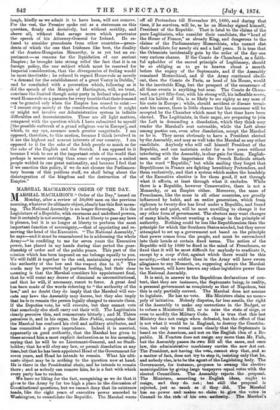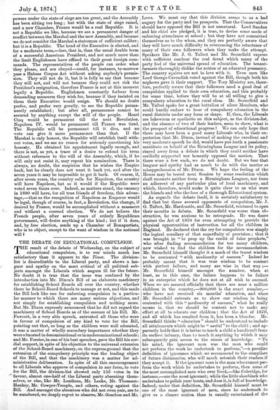MARSHAL MACMAEEON'S ORDER OF THE DAY.
MARSHAL MACMAHON'S "Order of the Day," issued on Monday, after a review of 50,000 men on the previous morning, whatever its ultimate object, clearly has this first mean- ing. The National Assembly is no longer Sovereign. It is the Legislature of a Republic, with enormous and undefined powers, but it certainly is not sovereign. It is at liberty to pass any laws it pleases, but it is no longer at liberty to perform the most important function of sovereignty,—that of appointing and re- moving the head of the Executive. "The National Assembly," he says—and it must be remembered he is addressing the whole Army—" in confiding to me for seven years the Executive power, has placed in my hands during that period the guar- dianship of order and of the public peace. This part of the mission which has been imposed on me belongs equally to you. We will fulfil it together to the end, maintaining everywhere the authority of the law and the respect due to it." The words may be perverted by partisan feeling, but their clear meaning is that the Marshal considers his appointment final, that he will resist any decree of dismissal as unconstitutional, and that he will, if necessary, resort to force. A great deal has been made of the words referring to "the authority of the law," and no doubt they do imply that the Marshal will exe- cute any laws the Assembly may decree, but they also imply that he is to remain the person legally charged to execute them. If the Deputies vote, he will execute, but they cannot vote that somebody else shall carry out their will. The Legitimists clearly perceive this, and remonstrate bitterly ; and M. Thiers perceives it, and in his organ, the Bien. Public, complains that the Marshal has confused his civil and military attributes, and has committed a grave imprudence. Indeed it is asserted, apparently on good authority, that the Marshal has given to those around him a most explicit declaration as to his meaning, saying that he will be no Lieutenant-General, and no Stadt- holder; that he will obey any law, or permit dissolution at any time, but that he has beenappointed Head of the Government for seven years, and Head he intends to remain. What his ulti- mate object may be is nothing to the question now at hand. He is there in the Presidential chair, and he intends to remain there ; and as nobody can remove him, he is a fact with which every party has to reckon.
We have no liking for the fact, recognising as we do that it gives to the Army by far too high a place in the discussion of Constitutional questions, but we cannot deny that its existence tends, like the eight years of executive power accorded to Washington, to consolidate the Republic. The Marshal warns off all Pretenders till November 20, 1880, and during that time, if he survives, will be, as he on Monday signed himself, President of the Republic. That is fatal to the claims of the pure Legitimists, who consider their candidate, the "head of the House of France," as already King, and dangerous to the claims of the Parliamentary Monarchists, who cannot seat their candidate for nearly six and a half. years. It is true that the Orleanists incidentally gain by the order of the day one very curious chance. If the Comte de • Chambord, as a faith- ful upholder of the sacred principle of Legitimacy, should be so obliging as to go to heaven about a month before the expiry of the Septennate and if the Assembly remained Monarchical, and if the Army continued obedi- ent, then the Comte de Paris, as head of his House, would
be the inevitable King, but the prospect of occurrence of all those events is anything but near. The Comte de Cham- bord, not yet fifty-four, with his strong will, his inflexible nerve, and his habits of life, is as likely to see eighty as any man of his caste in Europe ; while, should accident or disease termi- nate his career, there is little chance that his successor will be accepted by the Chamber which must by that time have been elected. The Legitimists, in their anger, are preparing to join the Left in demanding a dissolution, which they think may render the Marshal's seat untenable, while the Left alone among pasties can, even after dissolution, accept the Marshal as he is. They mean obviously to have a President elected by the Assembly, and may as well take the Marshal as any other candidate. Anybody who will call himself President of the Republic, and can maintain order for a few years without interfering with the Assembly, is clear gain for them. English- men smile at the importance the French Radicals attach to the word "Republic," but while smiling they forget that Republicans in France are fighting hereditary Pretenders and them exclusively, and that a system which makes the headship of the Executive elective is for them good, if not through what it effects, at least through what it excludes. While there is a Republic, however Conservative, there is not a Monarchy, or an Empire either. Moreover, the mass of Frenchmen, like the mass in all other countries, are greatly influenced by habit, and an entire generation, which from eighteen to twenty-five has lived under a Republic, and found it orderly and quiet, will be most unwilling to change it for any other formof government. The electors may want changes of many kinds, without wanting a change in the principle of authority. Nothing could be less like Republicanism than the principle for which the Southern States seceded, but they never attempted to set up a government not based on the principle that power comes from the people, and must be surrendered into their hands at certain fixed terms. The notion of the Republic will by 1880 be fixed in the mind of Frenchmen, so fixed that it will be most difficult for anybody to eradicate it, except by a coup d'etat, against which there would be this security,—that no soldier then in the Army will have sworn allegiance to any Monarch, or, supposing always the Marshal to be honest, will have known any other legislative power than the National Assembly.
It is mid, in answer to the Republican declarations of con- tent, that they are insincere, the Septennate being, in reality, a personal government as completely as that of Napoleon, but this is only partially correct. The Marshal does not assume to legislate. He has no 'veto. His Ministers claim no monc- poly of initiative. Nobody disputes, far less assails, the right of the Assembly to make any corrections in the Budget, or to refuse a Ministerial Bill, or to raise the state of siege, or even to modify the Military Code. It is true that this last Ministry does not resign when defeated, bat the effect of that is not what it would be in England, to destroy the Constitu- tion, but only to reveal more clearly that the Septennate is based on the American, and not on the English idea of a Re- public. M. Fourtou does not resign any more than Mr. Fish, but the Assembly passes its own Bill all the same, and once law, the administrative machinery carries the new Act out. The President, not having the veto, cannot stop that, and as a matter of fact, does not try to stop it, insisting only that he, and nobody else, is to be the agent of the Legislating body. The Government, for instance, proposes to swamp the elective municipalities by giving large taxpayers equal votes with the elected Councillors. The Assembly rejects the proposal. The Ministers, according to English ideas, ought to resign, and they do not ; bat still the proposal is rejected, just as much as if they did. The Marshal has no power and makes no claim to give the votes in Council to the rich of his own authority. The Marshal's
powers under the state of siege are too great, and the Assembly has been Bitting too long ; but with the state of siege raised, and a new Chamber, France would be a real Republic. It is not a Republic we like, because we see a permanent danger of conflict between the Marshal and the new Assembly, and because we do not consider the Marshal a statesman of sufficient calibre; but it is a Republic. The head of the Executive is elected, and for a moderate term,—less, that is, than the usual double term of a successful Americas). President, and not much more than the limit Englishmen have affixed to their great foreign com- mands. The representatives of the people can order what they please, and are obeyed—could, for instance, to-morrow pass a Habeas Corpus Act without asking anybody's permis- sion. They will not do it, but it is folly to say that because they will not, and will not because they could not risk the President's resignation, therefore France is not at this moment legally a Republic. Englishmen constantly forbear from demanding measures they wish for, because if they insisted on them their Executive would resign. We should no doubt prefer, and prefer very greatly, to see the Republic perma- nently established ; but after all, permanence cannot be secured by anything except the will of the people. Henri Cinq would be permanent till the next Revolution. Napoleon IV. would be permanent till France was tired. The Republic will be permanent till it dies, and no vote can give it more permanence than that. If the Marshal is only honest, the Republic will establish itself with- out votes, and we see no reason for seriously questioning his honesty. He obtained his appointment legally enough, and there is not, as yet, a trace of a desire to extend his term withoot reference to the will of the Assembly, which, if he will only not resist it, may repeat his nomination. There is always, no doubt, the suspicion that he wishes the Empire back, but he clearly does not want it back yet, and after the seven years it may be impossible to get it back. Of course, if, after seven years, the country calls for Napoleon, the country will have Napoleon, but so it would if the Republic were voted seven times over. Indeed, as matters stand, the vacancy in 1880 will have, for all true friends of freedom, this advan- tage,—that as the recognition of Napoleon as Emperor would be legal, though of course, in fact, a Revolution, the change, if desired by France, would be accomplished without a massacre and without a coerced election. We do not believe the French people, after seven years of orderly Republican government, will desire anything of the kind ; but if it does, and, by free election, sends up a Chamber of BonapartiBts, who is to object, except to the want of wisdom in the national will



































 Previous page
Previous page